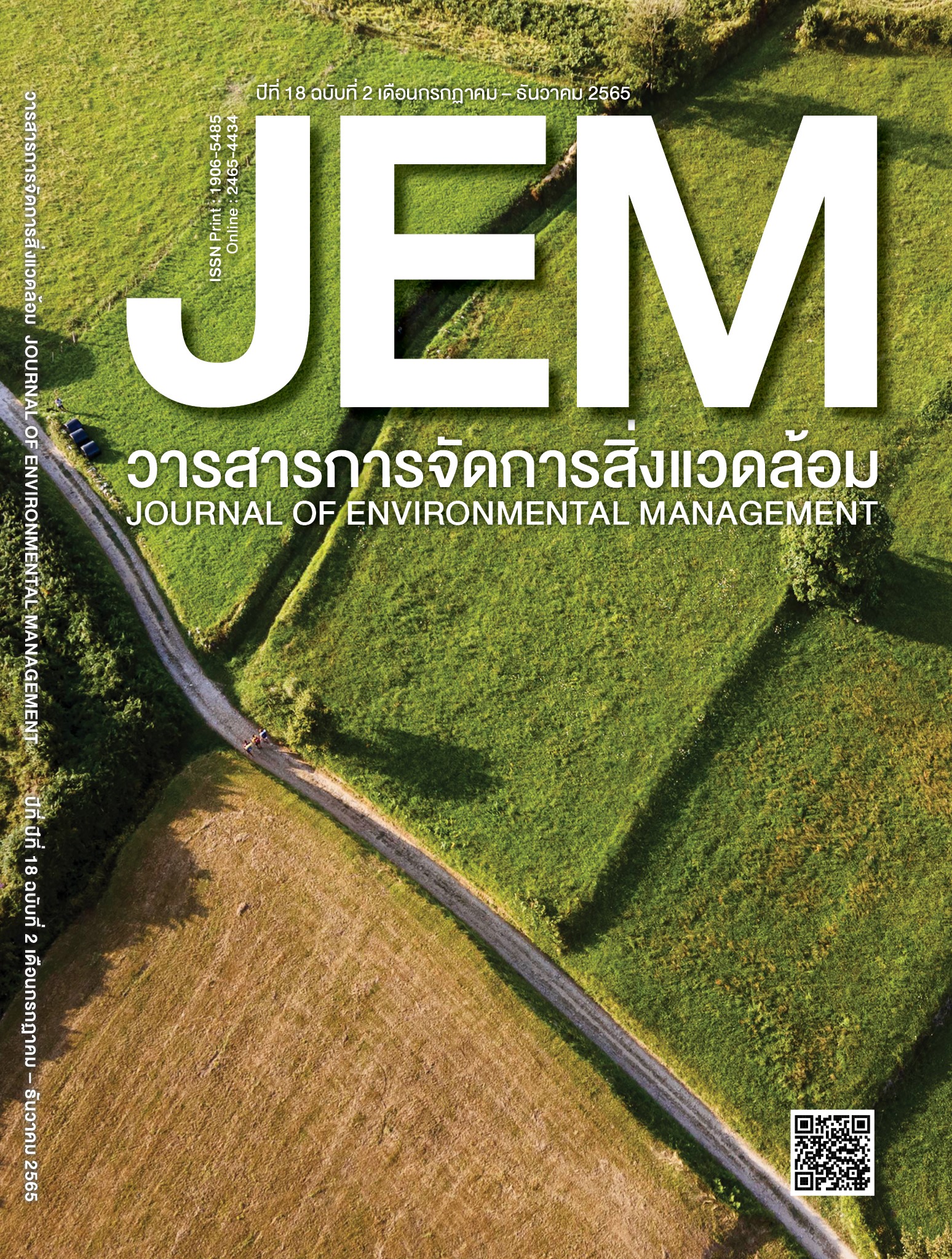ยุคที่มนุษย์เป็นใหญ่
DOI:
https://doi.org/10.14456/jem.2022.14คำสำคัญ:
โลกาภิวัตน์, มนุษยวิทยา, สิ่งแวดล้อมบทคัดย่อ
Globalization เป็นกระบวนการที่ทำให้โลกเล็กลงในแง่ของการตลาด การเงิน และเทคโนโลยี เพราะการสื่อสารและการคมนาคมที่รวดเร็วและสัมพันธ์กันมากขึ้น อย่างไรก็ดี ในยุคโลกาภิวัตน์มีทั้งผลดีและผลเสีย เนื่องจากยุคโลกาภิวัตน์มีความเกี่ยวข้องกับยุคการดำรงชีวิตและพฤติกรรมมนุษย์ (Anthropocene) ที่มนุษย์เป็นใหญ่เหนือธรรมชาติ ยุคนี้เป็นยุคที่มนุษย์ทำลายสิ่งแวดล้อม (Ecocide) และเน้นการเมืองสีเขียวซึ่งนำไปสู่การร่วมมือระหว่างมนุษย์ สัตว์ และสิ่งแวดล้อม เพื่อให้เกิดความมั่นคงทางการเกษตรและอาหาร มนุษย์ควรเป็นผู้พิทักษ์โลกในปัจจุบันและอนาคต แก้ปัญหาความยากจนและโรคภัยไข้เจ็บต่าง ๆ เพื่อนำไปสู่การพัฒนาที่ยั่งยืนทั้งโลก ยอมรับสิทธิของสิ่งที่ไม่ใช่มนุษย์ ไม่เอาเปรียบประเทศที่ยากจน แก้ไขปัญหาการเปลี่ยนแปลงของบรรยากาศ และร่วมมือกันแก้ไขสิ่งแวดล้อมเป็นประเด็นไป เพราะความมั่นคงของสิ่งแวดล้อมคือความมั่นคงของชาติ ในทางกฎหมายระหว่างประเทศเองก็ยังไม่สามารถแก้ไขความขัดแย้งทางสิ่งแวดล้อม จึงควรกำหนดสิ่งแวดล้อมไว้ในรัฐธรรมนูญของประเทศทั้งหลาย ระดับภูมิภาค หรือในระดับโลก ในที่สุด สิ่งแวดล้อมในยุคการดำรงชีวิตและพฤติกรรมมนุษย์ได้หันกลับไปเน้นจริยธรรมของชาวตะวันออกและชาวอินเดียนแดงมากขึ้น และได้ยืนยันว่าต้นไม้ก็เป็นสิ่งมีชีวิต มีความรู้สึก และมีประสบการณ์ ในขณะเดียวกันธรรมชาติในเมืองก็ได้รับความสนใจเพิ่มขึ้น
เอกสารอ้างอิง
Afshin, A. (2018). Global Governance of the Environment, Cheltenham, UK: Edward Elgar.
Andrew, B. (2005). Globalisation and the Environment: Endgame or a New Renaissance?. In Paavola and Lowe, eds., Environmental Values in A Globalizing World, London: Routledge, pp. 17-37.
Andrew, L. (2021). The Urban Blind Spot in Environmental Ethics. In Mathew Humphrey, ed., Political Theory and the Environment, London: Frank Cass, pp. 7-35.
Bangkok Post. (2020). 5 October 2020, p. 6; 6 January 2020, p. B5.
Carl, D. & Paul, T. (2017). Green States and Global Environmental Politics. In C, & S. Traditions and Trends in Global Environmental Politics
Chasek, P.S., Downie, D.L., & Brown, J.W. (2018). Global Environmental Politics, Oxon: Routledge, ch. 4.
China Daily. (2013). May 10-16, 2013, p. 4.
Crutzen P.J., & Stoermer E.F. (2000). The “Anthropocene”. IGBP Newsletter
Franziska, M. (2019). International Theory in the Anthropocene. In Hickmann, et al, eds., The Anthropocene Debate and Political Science, Oxon: Routledge, pp. 67-82.
Gillard, R., Ford, L., & Gabriela K. (2018). Justice Discourses and the Global Environment. In C & S, eds., Global Environmental Politics, Oxon: Routledge, ch. 7.
Hugh, C, D. (2018). Security Politics and Climate Change. In C, & S, eds., Global Environmental Politics, Oxon: Routledge, ch. 9.
Jennifer, C & Peter, D. (2005). Paths to a Green World, Cambridge, Mass: MIT Press.
Jim, D. (2005). Assuming Responsibility for Our Rose. In Paavola and Lowe, eds., Environmental Values in A Globalizing World, London: Routledge, pp. 215-235.
Jens, M. (2019). Worlds Apart? The Global South and the Anthropocene. In Hickmann, et al, eds, The Anthropocene Debate and Political Science, Oxon: Routledge,pp. 200-218.
John, G. (2021). The Anthropocene Reviewed, London: Ebury Press.
Jonna, N. (2018). Energy Security in an Age of Environmental Change. In C, & S, eds., Global Environmental Politics, Oxon: Routledge, ch. 10Louis J. K. (2016).
Jörg, T. (2019). The Anthropocene Concept as a Wake-up Call for Reforming Democracy. In Hickmann, et al, eds., The Anthropocene Debate and Political Science, Oxon: Routledge, pp. 219-236
Kate, S. (2015) The Enchantments and Disenchantments of Nature: Implications for Consumption in A Globalised World. In Paavola and Lowe, eds., Environmental Values in A Globalizing World, London: Routledge, pp. 51-65
Ian, L, & J, P. (2005). Environmental Values in A Globalizing World. In Jouni Paavola and Ian Lowe, eds., Environmental Values in A Globalizing World, London: Routledge, pp. 3-14.
Louis, j. (2016). Global Environmental Constitutionalism in the Anthropocene, Oxford: Bloomsburg.
Lowe, L., & Paavola J. (2007). Environmental Values in A Globalizing World, London: Routledge, pp. 66-79.
Lundershausen, J. (2019). Disentangling Descriptions of and Responses to the Anthropocene. In Hickmann, et al, eds., The Anthropocene Debate and Political Science, Oxon: Routledge, pp. 31-47.
Maike, W. (2019). Rethinking the Anthropocene Narrative with Arendt and Adorno. In Hickmann, et al, eds., The Anthropocene Debate and Political Science, Oxon: Routledge, pp. 15-30.
Olaf, C., & Hayley, S. (2018). IR and the Earth. In Olaf Corry and Hayley Stevenson, eds., Global Environmental Politics, Oxon: Routledge, ch. 1.
Olaf, C., & Hayley, S. (2018). International Relations as if the Earth Matters. In C, & S, eds., Global Environmental Politics, Oxon: Routledge,ch. 11.
Paul, G, H. (2005). Environmental Values in a Globalising World: The Case of China. In Paavola and Lowe, eds., Environmental Values in A Globalizing World, London: Routledge, pp. 123-139.
Peter, N., & Richard, L. (2017). IPE and the Environment in the Age of the Anthropocene. In C, & S, eds., Global Environmental Politics, Oxon: Routledge, ch. 8.
Peter, W, H. (2015). Life of Trees (Das Geheime Leben der Bäume, München, Germany: Ludwig Buchverlag verlag, 2015)
Robert, F. (2018). International Climate Politics between Pluralism and Solidarism. In C, & S, eds., Global Environmental Politics, Oxon: Routledge, ch. 2.
Robin, A. (2015). The Ethics of the Global Environment, Second Edition, Edinburgh: Edinburgh University Press.
Robin W, K. (2013). Braiding Sweetgrass, Minneapolis: Milkweed.
Sevasti-E, V. (2018). Problematising the Unitary Actor Assumption in IR. In C, & S, eds., Global Environmental Politics, Oxon: Routledge, ch. 3.
Stephanie, Kaza. (1996). The Attentive Heart, Boston: Shambhala.
Stephen, H. (2018). Post Humanism and Geo-engineering. In C & S, eds. Global Environmental Politics, Oxon: Routledge, ch. 6.
The Nations. (2009) 24 May, p. 4B; 7.
The Nations. (2009). June, p. 7A.
The Nations. (2012), 2 November, p. 4B.
The Nations. (2015) 2 November, p. 15B.
The Nations. (2014) 2 February, p. 4B.
The Nations. (2014) 2 February, p. 2B.
Thomas, H, Lena P, Philipp P & Sabine, W. (2019). Introduction: a Political Science Perspective on the Anthropocene. In Hickmann, et al, eds., The Anthropocene Debate and Political Science, Oxon: Routledge.



